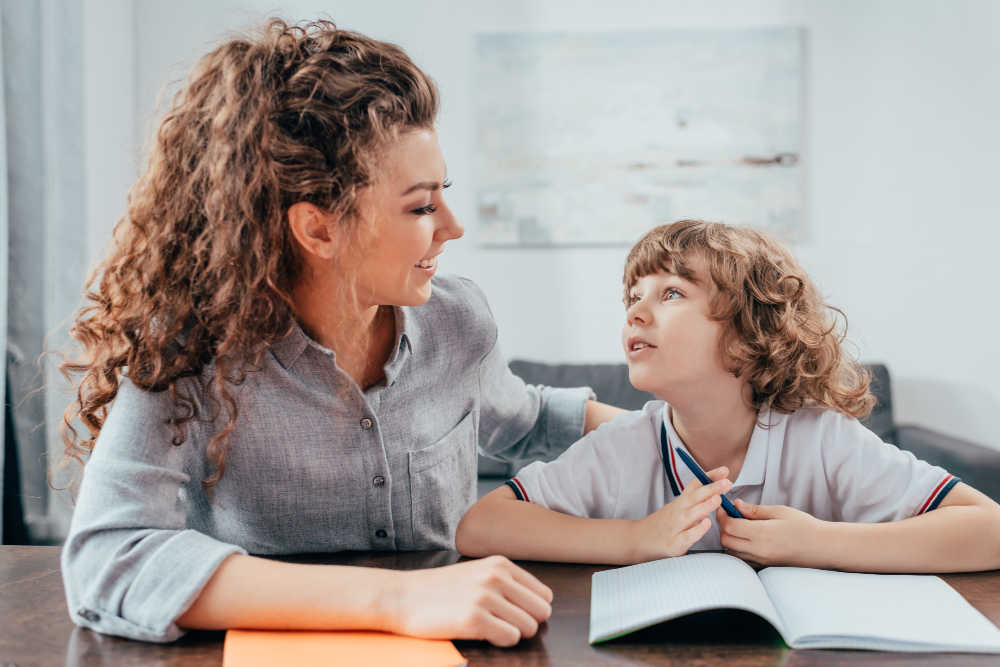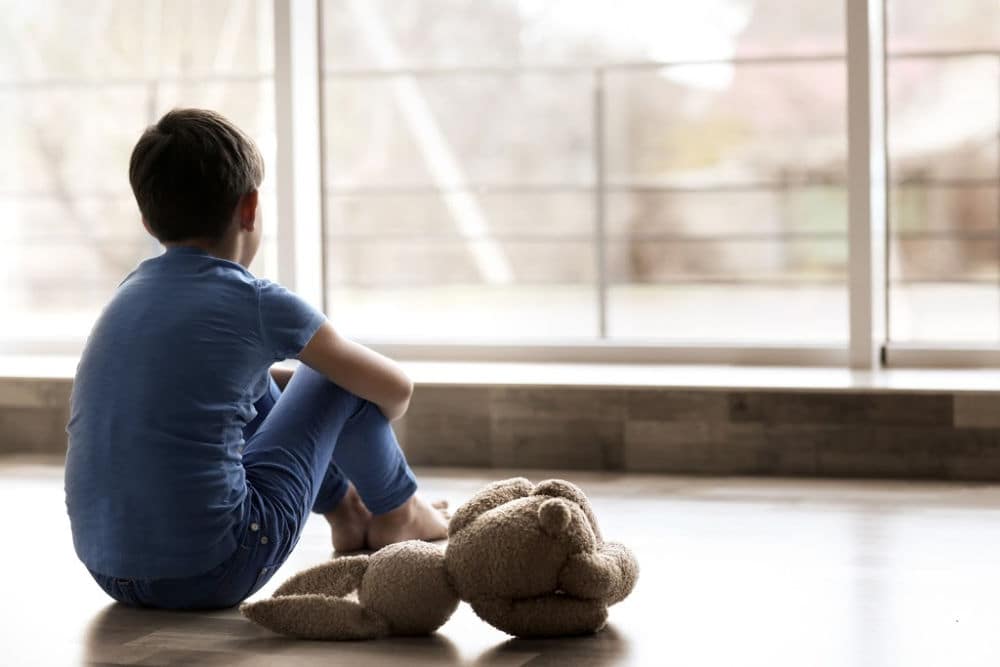Table of Contents
When a child’s behaviour is unmanageable, the whole family can feel it’s in a state of chaos. Equipped with one powerful analogy, parents can develop a protocol to turn their child’s behaviour around. These strategies are rooted in developmental and psychological research and can have immediate effects.
Through the glass walls of the vineyard restaurant, I could see the rest of my family. The adults were drinking merlot in celebration of my parents’ wedding anniversary and everyone except my son and I were enjoying fresh pasta and fire-roasted pizza.
The wind whipped around us and the sky was overcast.
I barely felt chilled as my heart was racing. I focused in on my son. All that mattered at that moment was my child’s behaviour. As I sat in the hard plastic chair, I racked my brain to think of what was going on. If I was honest with myself, this angry behaviour had been getting worse for months.
My once earnest and affectionate son was now prone to misbehaviour, easily provoked and backtalked readily.
In fact, what lead up to our current standoff was behaviour I had never seen before. He was rude to my parents and, when I said that he and I go outside to talk, he ran through the high-end Italian restaurant away from me.
But it only got worse.
Though my child running through a restaurant is something I thought I would never see. And, even though this was most certainly disruptive to the other patrons – something I would never want. What concerned about at that very moment was my son. What was going on inside of him that he was this angry and this disconnected?
When I brought him outside, it was clear just how bad he felt.
“Love, what is going on with you?”
He screeched and pulled away from me. I let him sit as far away from me as he wanted. But I persisted.
“I’m worried. What’s making you upset?”
A defiant look consumed his face as he challenged me.
“I’m a bad boy and I want you to go away.”
Related reading: Calming an Angry Child: Positive parenting strategies that work
It was our lowest mother-son moment to date.
And while the recent memory of this event still stings, the next morning and every day since has been vastly different. In fact, as I write this, I realize we haven’t had one word of backtalk and no major behaviour problems since that night. Right now, my son is arguably the best version of himself he’s ever been.
So this begs the question, what changed?
The analogy that will change the way you see your child’s behaviour
When my son said those ten fateful words to me, it catapulted me into action. At the time, I was reading a book, Simplicity Parenting, that created a brilliant analogy for any period like this in a child’s life.
Author and family therapist, Kim John Payne suggests that when a child’s behaviour becomes unrecognizable and/or unmanageable, the parent should see this as a soul fever.
He explains that when a child has a physical fever our knee jerk reaction is to cancel extra activities, call in sick to school, and nurse our child back to health. His schedule gets simpler, the home gets quieter, and our interactions soften until such time as he is back to normal. In the case of a soul fever, the protocol should be similar. We should simplify ours and our child’s schedules and nurse our child’s mental wellbeing back to health. What that looks like is dependent on the noise in the child’s life. And I will get into what I did next.
But my first move was to frame my son’s behaviour as a soul fever – or a byproduct of his mental health at the time – and not take it personally. Instead, I needed to develop a soul fever protocol to get him healthier again.
Related reading: Parenting a Strong-Willed Sensitive Child: What you need to know
Research-backed ways to turn behaviour problems around
Equipped with this analogy, I decided to both simplify mine and my son’s life while using strategies from the research articles I’ve read. Though these strategies are applied to mine and my son’s relationship, they are based on the most current studies in relationship and developmental psychology and therefore have broad applications for different children with different behavioural problems.
1. Use the magic wand technique to problem-solve.
Countless times I had asked my son what was wrong. I did it in the heat of the moment and when he and I were calm.
It got me nowhere.
After packing up our uneaten pasta and heading back to our hotel, I laid beside him in his bed in the dark and tried a technique I had learned in counselling.
First, I asked my son to list off everything in the world that was bothering him. Yet again, we didn’t get that far, but I did my best to brainstorm with him to help him identify what was up. He admitted some of my guesses were right and some of them were wrong. This was progress.
Then, I asked him, the question I had learned in counselling. If he had a magic wand that could fix any problem in his life, what would he fix? That’s when the words started flowing. He told me about his fears, what hurt his heart, and what he wished we did more in our family. His answers were so heartfelt and honest. It was a pivotal moment.
2. Enact the 5:1 ratio.
When my son called himself “a bad boy,” I knew that our interactions were at the point where it seemed like every time I spoke to him, I was correcting him. I had read marriage expert, Dr. John Gottman’s article about how healthy romantic relationships averaged five positive interactions for every one negative one. It wasn’t until I watched my friend, Dayna’s Calm the Chaos seminar that I thought to apply this philosophy to my children.
Related reading: Powerful Strategies to Turn Your Child’s Anger and Difficult Behaviour Around
What this means for real-life…
After our big blow out, I bought my son a little journal from the dollar store. Whenever I see it out, I write a quick note about something I love about him or something I’m grateful for that he did. Now, he often hands me the book with a pencil to prompt me to write something. Or, we read through it together.

Also, if there has been an argument or conflict, I remind myself of this ideal ratio. I never count out five interactions, simply I use it as a reminder to seek out ways to show him love and affection so that he feels good in our relationship.
3. Simplify your environment and the noise of life.
Because I was already reading the book, Simplicity Parenting, I had already started simplifying our lives. Though this process started before, I believe it accelerated the improvement in my child’s behaviour.
First, I started with toys (environment).
With the help of my kids, I threw out broken toys and donated ones they no longer cared about. Then, we packed up any toys that aren’t favourites and put the garage to be rotated out. I left the remaining ones their rooms or the playroom.
Research shows children with fewer toys engage in longer, more elaborate epochs of play (1). Since getting rid of most of our toys, I notice my kids are more focused and calmer in play.
Then, I moved onto the noise of life.
This has meant, less screen time for us and the kids, less background noise, and signing up for fewer extracurricular activities. I also put off doing school or freelance work when they’re not in school and have said no to extra work hours when I can. After school, we go to the park. Or if the weather is particularly awful, I have markers and paints out. I avoid doing any work during this time. And I either participate in wa game with them or read as they play. I have found in being available for them (versus frantically trying not to be interrupted doing school work), the whole family is more peaceful.
4. Tackle one to two problems at a time.
When it comes to difficult behaviour or children with behavioural problems, clinical child psychologist, Ross Greene has loads of invaluable information. A pioneer in addressing difficult child behaviour, Greene recommends viewing a child’s behaviour as the byproduct of lagging skills and unsolved problems rather than poor choices.
Once caregivers understand that it is lagging skills and unsolved problems that contribute to children’s challenging behavior, many of the intervention strategies that are often applied to modify that behavior (stickers, time-outs, detentions, suspensions, corporal punishment) no longer make sense…because those interventions don’t solve problems and don’t teach skills.
Dr Ross Greene
While I recommend his entire book, The Explosive Child, the main point I will share with you today is that when addressing an overwhelming amount of difficult child behaviour, the best course of action is to identify all of the ways your child has difficulty. Then, plan on tackling one or two and let the rest slide. As hard as this is, this means abandoning all other battles until a child has developed the skills needed to achieve the one or two problems you have decided on.
So, if I am working on getting my son to school without a meltdown. That is my number one goal and not forcing him to brush his teeth for now. I will still prompt him but if I sense a power struggle coming on, I will let it go and try later again that day.
Related reading: How to stop yelling at your kids using one simple strategy
5. Say yes as often as possible.
When I realized our interactions were leading my son to think he was “bad,” I also realized that I was using negative language far too much. The issue with negative language is that it tends to put people into a reactive (or defensive) mindset. As Dr Daniel Siegel often shares in his lectures, all you need to do is say no out loud to yourself repeatedly and then yes to notice the difference you feel in your own mental and physical states (2). In the book, The Yes Brain Child: How to develop courage, curiosity and resilience in children, Siegel and Payne Bryson explain that saying yes isn’t about permissiveness but about developing resilience.
Consider
“No, you can’t have a cookie,” vs. “Yes, you can have a cookie after dinner.”
“No, you can’t play outside. You haven’t cleaned your room,” vs. “Yes, you can play outside as soon as your room is clean.”
They are essentially the same message. However, the latter two are encouraging, decrease defensiveness, and also show that you are finding a solution that works for both of you. This is invaluable modelling. When I do this, not only will my son be more inclined to use positive language with me, he will also learn to look for a ways to problem-solve.
6. Establish a healthy rhythm.
I realized our life had gotten pretty chaotic. I was working out of the home three days a week and was at school two days a week. In Simplicity Parenting, Payne recommends when unpredictability can’t be eliminated, to communicate the plan.
So each morning, we let our children know who is picking them up and if I will be home before bedtime or not. I have also made a point of making sure on the five nights I am home each week, that we sit down for dinner. Slowing down, making family dinner a priority and making sure there is no TV on has also had a calming effect on our whole family. The kids are also helping out more because life seems less rushed.
7. Forgive yourself and your child when either of you get off track.
I know I can get off track and not parent intentionally. I also know that all of my children’s behaviour can ebb and flow based on what’s happening in their own lives. In his research about shaping emotional development, Dr Allan Schore found that mothers were likely to make mistakes often. However, the mothers who had children who fared the best were the ones who re-connected with their babies.
This has two applications for my life…
- I will likely get off track and need to forgive myself.
- If I’m likely to get off track, my young boy is that much more likely to get off track. Instead of looking at any regressions as a failure, I need to be his source of comfort and guidance.
A final note about child behaviour
Before that fateful day at the vineyard, I felt as though I was losing my son. The pivotal moment started when I reframed my son’s behaviour. It was as if he had soul fever.
In changing the way I viewed my son’s outbursts I could come up with a protocol for mental health. I was able to assemble strategies from books and research I read. Now, I’m focusing less on stopping his behaviour and more on facilitating calmness, problem-solving with him, and prioritizing connection and positivity. I know I won’t always execute perfectly and neither will he. Understanding that we both will falter and getting back to this approach is crucial not only for him and me, but for the peace and wellbeing of the whole family.
More resources for improving your child’s behaviour including the books recommended in this post
How to Discipline a Child: Why Science says this is the best approach
How negative language impacts kids and how to speak more effectively
Parenting a Strong-Willed Sensitive Child: This is what you need to know
Powerful Strategies to Turn Your Child’s Anger and Difficult Behaviour Around
BOOK: Simplicity Parenting by Kim John Payne
BOOK: The Explosive Child by Dr Ross Greene
BOOK: The Yes Brain Child: How to develop courage, curiosity and resilience in children by Dr Daniel Siegel and Dr Tina Bryson












THIS is just what I’ve been looking for, ADVICE to teach my less than patient 21yr.old Daughter how to PARENT her almost 2yr.old Daughter. She absolutely doesn’t want ANY advice from MOM!!! I NEED something to work I’m EXTREMELY CONCERNED for my GRANDDAUGHTER!!!